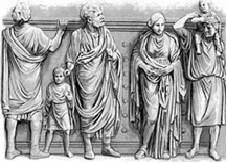 O tempora! O mores!
O tempora! O mores!
Part 1 Of Rome and Judea
 O tempora! O mores!
O tempora! O mores!
Oh, the times! Oh, the morals!1
To the Romans and the rest of the world, the Christians were still members of the kingdom of Judea. To understand the relationship of Rome and the Christians, it is important to understand the relationship of Rome and the Jews or even Rome and the rest of the gentiles, or nations. Christians were those who believed in Yeshua, a.k.a. Jesus, as the Anointed, the Christ, the Messiah of Israel, the King of Judea.
Rome did not always expand its influence of conquest with its army. The life expectancy of the Roman soldier was greater than any other profession. The soldiers were more builders than destroyers. They did bring order by their military might and a system of law, but it was more profitable to maintain it with a flourishing system of building and trade.
“Philosophy, with the aid of experience, has at length banished the study of alchemy; and the present age, however desirous of riches, is content to seek them by the humbler means of commerce and industry.” 2
As with all mankind, wealth and affluence brought with it apathy, corruption, and oppression. The moral decline that comes when society loses track of the wisdom of its own creation is seldom accompanied by a decline in appetite for pleasure. The contrary is traditionally the case. The “haves’” desire for more is often appeased at the price of the “poor”. Before the poor's anguish turns to rage, it is often pacified by the promise of entitlements. In a society of rank, both rich and poor will consume the working middle classes. It will become important, even necessary, to expand by taking from a foreign neighbor.
The greatest assets to Roman conquest was the legal entanglements of its diplomacy, commerce, and law. The clever complexity of their commerce and the efficiency of their armies and engineers were all essential parts of the Roman machine that steadily marched them toward a new world order. The farther on this road they continued, the more distant the wisdom of their own beginnings became.
Rome had been a predominate influence in the world for many years; while under its errant kings, Israel had declined. Roman trade was prized and their ingenuity in constructing roads, aqueducts, harbors, and ships was unsurpassed. Romans were building ships larger than Noah’s ark in 400 BC.. Just one of these ships carried tons of cargo and thousands of passengers including “4000 rowers, 400 other crewmen, and 2850 marines”. 3
The Romans built a vast system of roads and poured concrete structures that are still in use today. They even lined entire lakes with lead, built dams, and hydraulically mined whole mountains out of existence. They were masters of trade and commerce. The elaborate science of money-making, taught to them by the Greeks, became a consuming passion. They even devised a tax system that has not been rivaled until today.
Few nations did not honor and respect the Roman achievements, acquisition, and affluence. It was generally more profitable to agree with Rome than it was to argue with its policy and sense of justice and law. They were more admired than despised, more loved than hated. Only the most precipitous and ardent lovers of independence and liberty or the foolish and ignorant dared to resist their influence.
Rome had been in a process of moral decline for centuries. That unavoidable descent accelerated as their power centralized and apathy, sloth, and avarice flourished. “All contributed to the general decay....” The social relations, such as matrimony and the family, were the core of Roman success, but now “the respect for mother and wife which had been so powerful in the maintenance of the Roman standard of morals, was grievously diminished.”4
The “sanctity of marriage had ceased… Abortion, and the exposure and murder of newly-born children, were common and tolerated; unnatural vices, which even the greatest philosophers practiced, if not advocated, attained proportions which defy description. As regards the Roman rule, matters had greatly changed for the worse since the mild sway of Augustus, under which, in the language of Philo, no one throughout the Empire dared to molest the Jews.” 5
Something had changed. Was it evolution or devolution of society through the abdication of rights and responsibilities? Rome had moved from the principles of individual independence, self- reliance, and the patriarchal family rights of a republic to an indirect social democracy. Central government with a controlling agenda seduced the people into apathy and ignorance. Ups and downs of the economy and political opportunism brought about Augustus’ Empirical powers which expanded under each new chosen leader.
Today, in the United States, living together out of wedlock, divorce, rebellious youth, abortion- on-demand, and promiscuous lifestyles of the rich, powerful, and famous are all tolerated, proclaimed, promoted, and even envied. Money powers rule a vitiated leadership and independence is mocked by the mercenary princes of government, the bureaucrat. The superimposing of moral conditions of Rome, and those present in the United States and the world in general, are a historical reminder if not a prophetic warning of the future. Unfortunately, the similarity continues.
1(In Catilinam I)
2The Decline and fall of the Roman Empire Chapter 13
3The Year-book of Facts in Science and Art, Ocean Steamers, By John Timbs
4Encyclopedia Britannica ‘57 Vol. 19 p 490.
5“Life and Times of Jesus the Messiah”, CHAPTER XI.